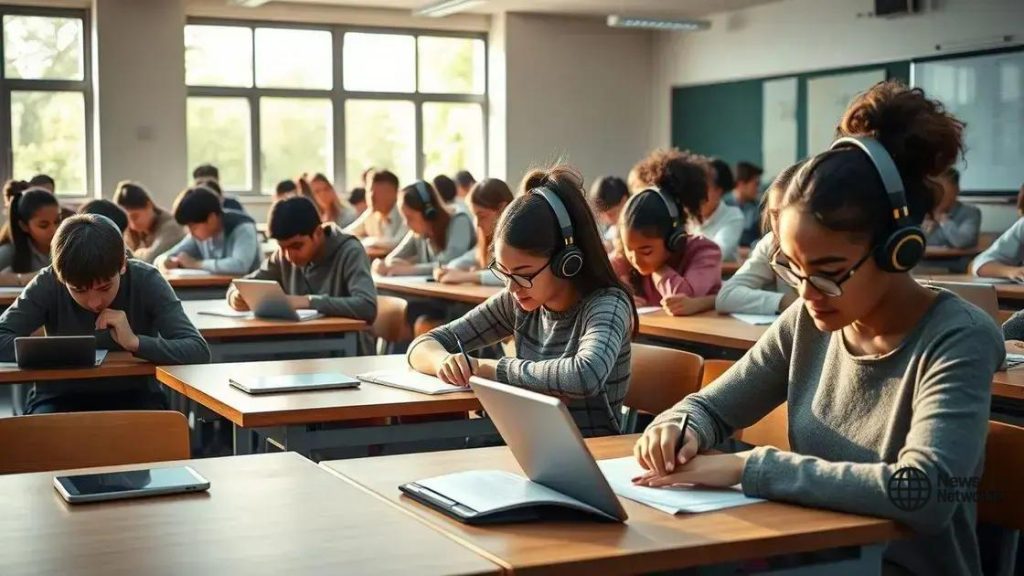Standardized testing changes and assessment updates you need to know

Standardized testing changes involve updates to assessment methods that emphasize critical thinking, technology integration, and personalized evaluations, shaping the future of education and enhancing student performance.
Standardized testing changes and assessment updates can significantly influence educational strategies. Have you ever wondered how these shifts affect learning experiences? This article sheds light on the important updates and their implications.
Understanding standardized testing changes
Understanding standardized testing changes is crucial for students, educators, and parents alike. These changes can affect how assessments are conducted and how results are interpreted.
The Importance of Staying Informed
With educational systems evolving, it is essential to stay updated on standardized testing changes. These changes can influence curriculum, teaching methods, and student evaluation. Engaging with the latest updates ensures that everyone involved in education can adapt appropriately.
Key Areas of Change
Several key areas are often affected by changes in standardized testing:
- Assessment Format: New testing formats may include technology-enhanced items.
- Scoring Methods: Adjustments in scoring can alter how student performances are ranked.
- Content Alignment: Changes may reflect updates to curriculum standards.
- Accommodations: Improved accommodations for diverse learners may be implemented.
The impact of these changes reaches far beyond the tests themselves. Understanding these nuances can enhance teaching strategies and improve student learning experiences. Many educators report that adapting to changes in standardized testing encourages innovative teaching practices.
Challenges of Interpretation
With any update, there may be challenges in interpreting results. Teachers and parents may have questions about how to gauge student success in relation to new standards. Maintaining open communication within schools can help address these concerns.
In addition, it is vital for schools to provide resources and training for teachers to navigate these changes effectively. Ensuring all educators understand the nuances of standardized testing changes can lead to a supportive learning environment for all students, allowing for better adaptation and improvement strategies.
Key updates in assessment methods
Key updates in assessment methods play an important role in shaping today’s educational landscape. These updates can directly impact how students are evaluated and how educators approach teaching.
Evolution of Assessment Techniques
In recent years, assessment techniques have evolved significantly. Traditional methods like multiple-choice questions are being supplemented or replaced by alternative formats that provide deeper insights into student understanding. Teachers are increasingly using performance-based tasks that showcase students’ abilities in real-world scenarios.
Innovative Approaches to Evaluation
There are several innovative approaches to assessment methods that schools are adopting:
- Formative Assessments: Frequent, ongoing assessments help teachers identify student needs in real time.
- Peer Assessments: Allowing students to evaluate one another’s work enhances critical thinking and collaboration skills.
- Portfolio Assessments: Collecting students’ work over time provides a holistic view of their progress.
- Digital Assessments: Technology-based assessments are flexible, incorporating multimedia and dynamic questions.
Understanding these diverse methods ensures that assessments are more aligned with learning objectives. By embracing a variety of techniques, educators can better support student growth and adaptation to different learning styles.
As these assessment methods continue to advance, educators must stay informed and responsive. Communication among educators can pave the way for sharing best practices and resources. This collaborative effort allows for a more comprehensive understanding of how key updates in assessment methods can benefit students.
The impact of changes on student performance

The impact of changes on student performance can be profound, influencing not just grades but the overall educational experience. As schools adapt to new assessment methods, students may experience varying levels of support and challenge.
Understanding the Effects
When changes in assessment practices occur, students may need time to adjust. They might respond positively to improved assessments that align with their learning styles. For instance, when students engage with more authentic assessments, they often show increased motivation.
Influence of Assessment Types
Different types of assessments can lead to specific impacts on student performance:
- Formative Assessments: Regular feedback from formative assessments helps students identify strengths and weaknesses in real-time.
- Performance-Based Tasks: Engaging in tasks that require real-world application can enhance critical thinking skills.
- Standardized Tests: While these tests measure basic skills, they may not fully represent a student’s capabilities.
- Technology-Enhanced Assessments: Digital assessments can provide immediate results, offering opportunities for quick adjustments in learning.
As education evolves, tracking these changes in student performance becomes essential. Educators should leverage data from new assessments to inform their teaching strategies. This ongoing adaptation helps ensure that instruction meets the diverse needs of learners.
Furthermore, open communication with students regarding assessment methods fosters a supportive environment. When students understand the purpose behind assessments, they are more likely to engage and invest in their learning.
Strategies for adapting to new assessment standards
Strategies for adapting to new assessment standards are essential for educators and students as education continues to evolve. Embracing these changes can enhance the learning experience for everyone involved in the educational process.
Professional Development
One effective strategy is to participate in professional development. Workshops, webinars, and coaching can provide teachers with the knowledge they need to implement new assessment standards effectively. By staying informed about the latest trends, educators can feel more confident in their teaching methods.
Engaging Students
Another important strategy is actively engaging students in their learning. When students understand the shifts in assessment standards, they are better equipped to adapt. This can be achieved through open classroom discussions, providing clear explanations of the new criteria, and involving students in setting personal goals.
Utilizing Technology
Incorporating technology can also facilitate this adaptation. Online platforms can help track student progress and provide instant feedback. This allows educators to adjust their teaching methods based on real-time data. Tools like quizzes, interactive assignments, and e-portfolios can enhance student engagement.
Moreover, fostering a culture of collaboration among educators is vital. By sharing resources and strategies, teachers can support one another as they navigate the transition to new assessment standards. Participating in collaborative planning sessions can also lead to innovative ideas and lessons that meet new expectations.
Creating a supportive environment in the classroom encourages students to embrace changes as well. When students know they can ask questions and seek help, they are more likely to take risks and learn from their mistakes.
Future trends in standardized testing
Future trends in standardized testing are shaping the way students are assessed. As technology evolves and educational needs change, these trends will likely influence assessment practices in meaningful ways.
Increased Use of Technology
One significant trend is the integration of technology into testing. Online assessments are becoming more common, allowing for greater flexibility and immediate feedback. This approach can enhance engagement and make tests more interactive. Furthermore, adaptive testing, which adjusts the level of difficulty based on a student’s performance, is gaining traction.
Focus on Skills Over Memorization
The emphasis is shifting from rote memorization to assessing critical thinking and problem-solving skills. Future standardized testing will likely include more performance-based tasks that require students to apply their knowledge in real-world contexts. This could lead to a more holistic evaluation of student capabilities.
Personalized Assessments
Personalized assessments tailored to individual student needs are on the rise. By recognizing different learning styles and paces, tests can become more relevant and effective. Schools are beginning to explore how assessments can be designed to reflect students’ unique strengths and weaknesses.
Moreover, incorporating social and emotional learning metrics into standardized testing is becoming increasingly important. Educators are recognizing that academic success is interconnected with social and emotional well-being. Future tests may measure students’ soft skills, preparing them for both academic and life challenges.
As these trends develop, collaboration among educators, policy makers, and technology experts will be crucial. Staying informed about these changes can help educators better prepare their students for future testing environments.
FAQ – Frequently Asked Questions about Standardized Testing Changes
What are standardized testing changes?
Standardized testing changes refer to updates in assessment methods, including new formats and evaluation criteria designed to better assess student knowledge and skills.
How do these changes impact student performance?
These changes can influence how students are evaluated, often focusing more on critical thinking and real-world application of knowledge rather than just rote memorization.
What role does technology play in future testing?
Technology is becoming integral to standardized testing, allowing for online assessments that provide immediate feedback and adaptive testing tailored to individual student needs.
How can educators adapt to these new assessment standards?
Educators can adapt by participating in professional development, utilizing technology, and fostering open communication with students about new testing methods and criteria.





